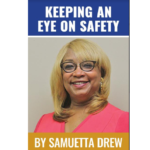By Samuetta Hill Drew
Last week’s safety article outlined three of the seven fraud prevention checklist items recommended by Amy Nofziger and Mark Fetterhoff, who are both with AARP’s Fraud Watch Network helpline team. This week we will summarize the final four checklist recommendations:
• Review Your Credit Report – Free credit reports are available from these three agencies – TransUnion, Experian, and Equifax. One free report is available each year per person. Stagger the requests throughout the year. Visit AnnualCreditReport.com and order yours as soon as possible if your bank or credit card company does not offer this service. Check your report, line by line, to ensure no one has opened credit in your name and that there are no errors.
• Add Two-Factor Authentication to Your Online Accounts – Increasingly, websites requiring a login (such as banks or credit card companies) offer this service, in addition to your password. You are required to enter a code they send to your phone to access your information. This means that even if scammers have gotten your account name and password, they still cannot get in.
• Refresh Your Facebook Security – Click the downward arrow button in the upper right corner of your Facebook page for Settings & Privacy and complete the Privacy Checkup. This easy-to-use wizard will guide you through settings that will enable you to lock your profile so that only your friends can see it – and scammers will be locked out.
• Add This Number to Your Contacts – If you have been targeted by scams, you are not alone. AARP has trained fraud specialists who provide support and guidance on what to do next and how to avoid scams in the future. The AARP Fraud Watch Network helpline is 877-908-3360. This service is free. AARP is eligible for anyone 50 years or older.
Hopefully, following these steps listed last week and this week in the articles featuring safety fraud prevention checklist will help you continue to Keep an Eye on Safety.










